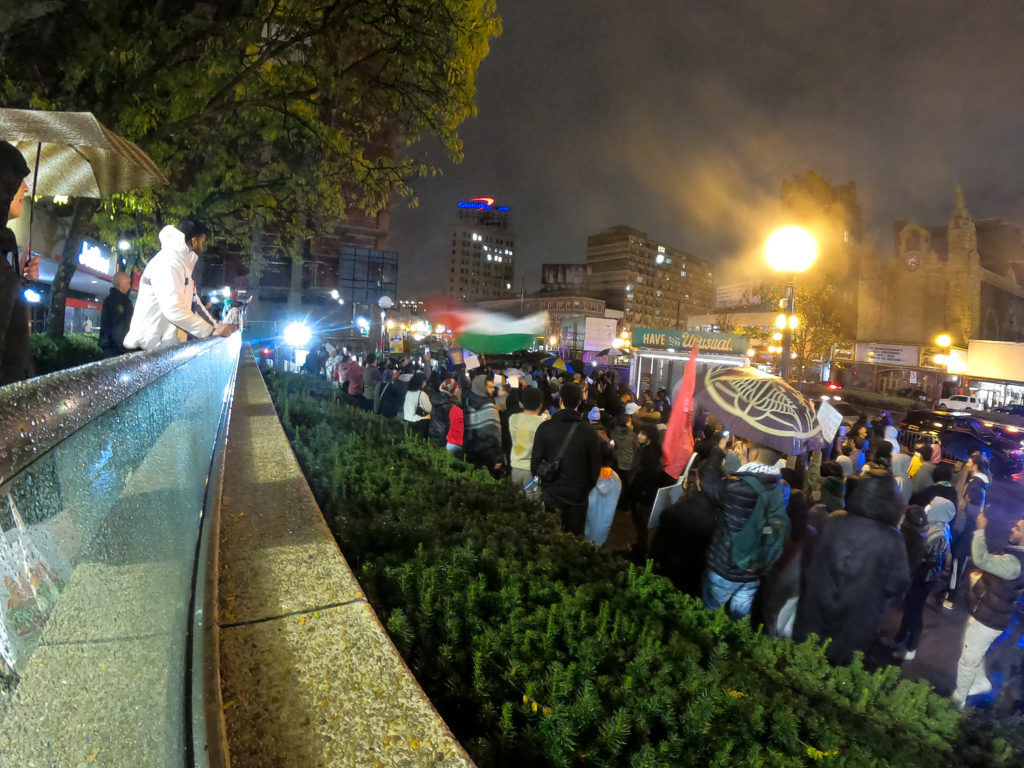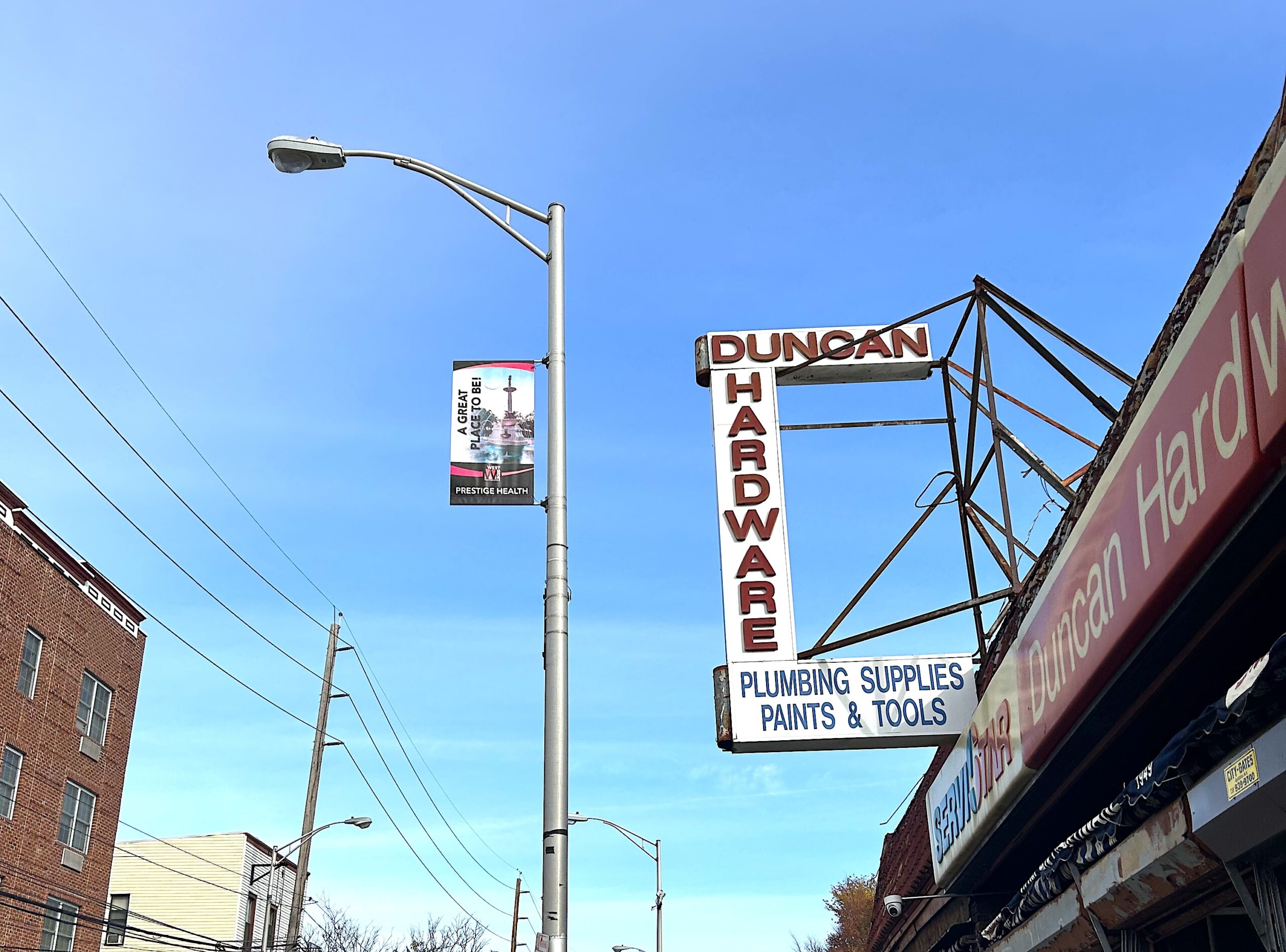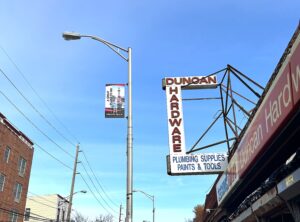Photo by civic engagement storyteller Xavier Boone.
“Free, free Palestine!” and “From the river to the sea, Palestine will be free!” were the chants heard throughout Journal Square, accompanied by flags of Palestine and picket signs for peace. Jersey City locals gathered in large numbers under the rain on Oct. 20 to rally against the war happening in the Middle East.
Oct. 7 became a date many will likely never forget, and the violent weeks that followed have brought outcries for the violence in Palestine and Israel to stop. On Friday, there were leaders and a rabbi from Jewish Voice for Peace and a local Democratic Socialist of America chapter hand-in-hand with a common goal: stop the bombardment.
Egyptian Jersey City native, Kareem, waved the Palestinian flag and said he had an instinctive duty to voice solidarity and support for finding peace in the long complicated history between Palestine and Israel.
“End the occupation. Stop the ethnic cleansing. Give the people back their land,” he told Slice of Culture.
A Look Into The Palestine-Israel History
1897: First Zionist congress takes place in Basel, Switzerland and the first Zionist organization is founded.
1907: Zionist leader Chaim Weizmann visits Palestine.
1908: First Palestinian anti-Zionist weekly newspaper is published by Arab Christian Najib Nassar.
1915: British cabinet member Herbert Samuel calls for the British annexation of Palestine in memorandum “The Future of Palestine.”
1916: European Powers conclude secret Sykes-Picot agreement dividing future spheres of influence in Ottoman Empire territories.
1917: The Balfour Declaration promises a “national home for the Jewish people in Palestine”.
1922: The League of Nations grants mandate over former Ottoman territory Palestine to UK. Provisions include terms of the Balfour Declaration, including a “Jewish national home”.
1942: US Zionists meet in NY and adopt the “Biltmore Programme“, calling for establishment of Palestine as a Jewish Commonwealth and for unlimited immigration.
1947: In February, UK proposes to relinquish its mandatory role and places the question of Palestine before the UN.
May 1948: Great Britain terminates the Mandate over Palestine and Israel declares independence on 15 May. Territorial expansion using force results in the first large-scale exodus of Palestinian refugees; 15 May becomes an official day to mark the Palestinian Nakba (“catastrophe”).
- Count Folke Bernadotte appointed UN Mediator in Palestine by the UN General Assembly. He is assassinated four months later by a Zionist militant group.
- The Security Council establishes a group of military observers to supervise the truce, which later became UNTSO.
Who is Hamas?
Israel is at war with Hamas, a political extremist group that rose from Gaza amidst the Zionist regime’s establishing.
Hamas is at war with Zionism, the belief that Judaism is a nationality and a religion, and that Jews deserve their own state in their ancestral homeland, Israel. Hamas targets Zionists, who is anyone fueled by the belief that the country’s land has been stolen from their people; in this case, it applies to Jewish people who believe their homeland is in Palestine and, therefore, they have the right to own it.
For many, this war is their introduction to Hamas, yet they have been established since 1987. Hamas is an acronym for Harakat al-Muqawama al-Islamiya (“Islamic Resistance Movement”) founded by Sheikh Ahmed Yassin as a response to the mass Zionist immigration and constant conflict that raged on as the Zionist settlers migrated to the region.
Hamas was voted into power in 2006 and following their success Israel pulled out of the Gaza strip in 2007 and declared the area a hostile entity; approving a series of sanctions that included power cuts, heavily restricted imports and border closures; the hatred in the region grew.

Israel’s Defense Force targets Hamas agents and their headquarters. Israeli is anyone born in Israel while Hamas agents can present as civilians although, they are the minority on the Gaza strip. Their headquarters is allegedly located in Gaza City, one of the most congested cities on the planet. The militant group allegedly has hideouts below heavily populated public sites, putting their very own average joe in crosshairs.
Since Oct. 7, the Israeli death toll is about 1,400 and Palestine’s death toll has surpassed 5,000, with a majority being civilians. The counterattack has progressed, and the airstrikes have been constant and unpredictable. Thousands of Palestinians fled south on Oct. 14 using what they could as they were instructed to do so by Israel, but were then met with more shelling.
Former Jersey City Board of Education President Mussab Ali and other Muslim leaders in the communities, directed the rally at U.S. President Joe Biden intending to support echoing demands around the nation for de-escalation.
“The ceasefire is the first step, so the death toll stops rising and then you’d have to work on something from there,” Ali Sayed, a Jersey City Native, told SOC.
He added, “I am doing the absolute bare minimum that I can do for these people.”
Many feel helplessness, but the ability to make a phone call and halt the attacks is on everyone’s mind.
What about the hostages?
Hamas is holding about 220 hostages, more than half have a foreign nationality. Basem Naim, a senior Hamas official, told NBC news that the foreigners “are not considered part of this conflict.” But Naim claims that the constant militant aggression and airstrikes on Gaza is the reason that the foreigners’ release is being postponed.
“This is really ridiculous… they know who to bomb but at the end of the day who’d they bomb? Hospitals, civilians, churches, mosques,” Ali, an Egyptian New York City commuter, told SOC.
“They started bombing the civilians out of nowhere out of scaredness. They’ve been scared for a few days and we’ve been scared for a few years.”
Civilian casualties and the alleged random sporadic consistent shelling is weighing down the nationals’ relationships and the trust for the countries involved to hold someone accountable.
(De-)Escalation?
The unexpected killing of Israeli civilians took place on Oct. 7. Israel Declared on war on Oct. 8 and the bombardment began. Journalists on the ground have been independently documenting the events.
Israel attempted to initiate an evacuation from northern to southern Gaza but, those that followed evacuation orders fell victim to shelling. A hospital in Gaza was also bombed, which is under investigation, and on week three Israel bombed a mosque in another heavily populated Palestinian area within Israel’s borders.
Tension is high as Israel’s goal is to eliminate Hamas. They are planning to do so through a land invasion of Gaza. Troops have been stationed on the border of Gaza for days. As a result, American soldiers were attacked across the Middle East, but once the countries were militarily situated, Israel pulled the trigger on the ground invasion, starting with north Gaza on Oct. 26 and intensified bombing on Khan Younis, Gaza.
Relations across the Middle East are at an all-time high and the world is watching the U.S. and Israel’s response.
“The biggest victim of war is the Palestinian people,” Ali Sayed told SOC.
The attendees were very clear and had a strong stance on one thing; halting the attacks on Gaza first, everything else must be addressed in sequence.



 Get your slice of culture from NJ
Get your slice of culture from NJ Hudson County born & raised
Hudson County born & raised The Locals + The Culture
The Locals + The Culture “Best Grassroots Journalism” @njspj + @njcivicinfo grantee
“Best Grassroots Journalism” @njspj + @njcivicinfo grantee



 We stopped by Excel
We stopped by Excel










 E
E
















